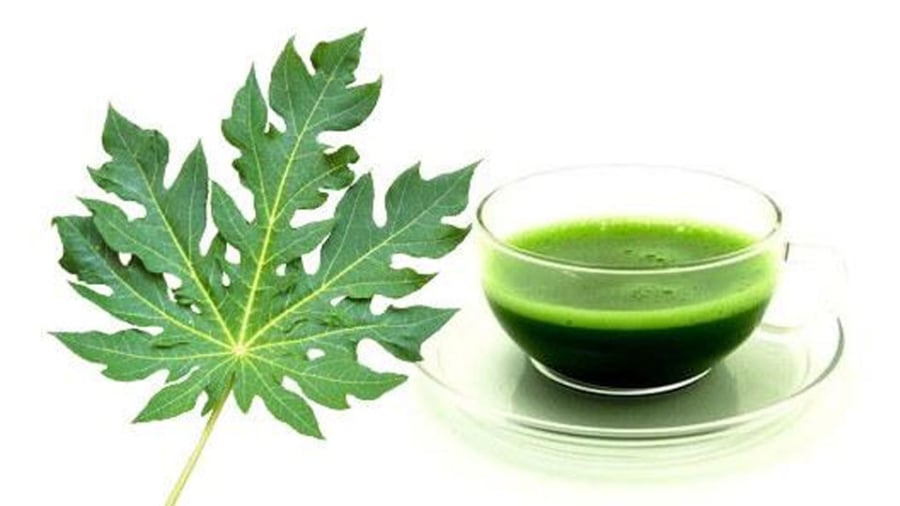Papaya Leaf Benefits: Modern Scientific Discoveries
According to Healthline, modern scientific research has confirmed the significant role of papaya leaves in promoting health and supporting the treatment of various issues. Here are some of the notable benefits that these leaves offer:
Boosting Immunity
Papaya leaves are rich in vitamin C and powerful antioxidants, which help fortify the body’s defenses against bacterial, viral, and other pathogenic attacks. Additionally, the flavonoids and alkaloids present in the leaves exhibit effective anti-inflammatory and antibacterial properties.
Supporting Platelet Recovery in Dengue Fever
One of the most well-known applications of papaya leaves is their ability to increase platelet count in the blood. This is particularly important in reducing the risk of bleeding and preventing severe complications associated with dengue fever. Studies indicate that extracts from papaya leaves can aid in the natural and safe regeneration of platelets.
Promoting Healthy Digestion
Papaya leaves contain the enzyme papain, a protein-digesting enzyme that supports digestion and alleviates symptoms of indigestion and bloating. The high fiber content in the leaves also improves bowel movement, relieves constipation, and maintains a healthy gut.

Papaya leaves contain papain, a protein-digesting enzyme that supports digestion.
Regulating Blood Sugar
Animal studies suggest that papaya leaf extract can lower blood sugar levels and increase insulin sensitivity. This discovery presents the potential for using papaya leaves as a supplementary therapy for individuals with diabetes or those at risk of developing the disease.
Cardiovascular Protection
Antioxidants such as lycopene and vitamin C in papaya leaves protect the heart from free radical damage. Furthermore, they help reduce bad cholesterol (LDL) and increase good cholesterol (HDL), thereby lowering the risk of cardiovascular diseases.
Potential Anti-Cancer Properties
Some laboratory and animal studies have indicated that compounds in papaya leaves may inhibit cancer cell growth. However, further clinical research is necessary to confirm these effects in humans.
Effective Anti-Inflammatory Action
Fresh papaya leaves or preparations made from them can be used to reduce inflammation both internally and externally. For instance, they help alleviate symptoms of arthritis, muscle pain, joint pain, and even skin issues like rashes. Nutrients such as papain, flavonoids, and vitamin E play a crucial role in the anti-inflammatory properties of the leaves.
Regulating Menstrual Cycles
In traditional medicine, papaya leaves are often used to support women during their menstrual cycles. Tea or infusions made from papaya leaves can reduce premenstrual symptoms such as abdominal pain, headaches, nausea, and indigestion.
Skin and Hair Care
Vitamin A and C in papaya leaves nourish the skin, reduce acne, and slow down the aging process. Additionally, the leaves help treat dandruff, stimulate hair growth, and promote stronger hair.

Vitamins A and C in papaya leaves nourish the skin and reduce acne.
Is Drinking Papaya Leaf Juice Daily Good for Your Health?
According to Doctor of Medicine and Traditional Medicine, Tran Ngoc Que, papaya leaves are a valuable herbal remedy in traditional medicine and are easily accessible. These leaves can be used effectively to prevent and support the treatment of various diseases. However, consuming papaya leaf juice should be done in appropriate doses to ensure safety and optimal benefits.
Typically, it is recommended to consume around 25-35 ml of papaya leaf juice, three times a week. This dosage may vary depending on individual needs and health conditions. However, excessive or continuous long-term consumption should be avoided to prevent potential adverse effects.
To ensure safety, it is advisable to consult a doctor before using papaya leaf juice, especially if you have chronic illnesses or are taking medication. This helps avoid drug interactions and ensures that consuming papaya leaves is suitable for your health condition.

Consult a doctor before using papaya leaf juice, especially if you have chronic illnesses.
How to Prepare Papaya Leaf Juice
There are two popular methods for preparing papaya leaf juice:
Papaya Leaf Juice
Juicing is the simplest and most effective way to incorporate papaya leaves into your daily diet.
Instructions:
– Prepare 7-10 young papaya leaves, wash them thoroughly, and pat dry. Remove the white stems.
– Put the leaves in a blender and blend until a smooth mixture is formed.
– Use a thin cloth or strainer to extract the concentrated juice, and store it in a glass jar. If not consumed immediately, it can be refrigerated.
– When drinking, take about 2 tablespoons (approximately 10 ml) of the papaya leaf juice and dilute it with 20 ml of water or cooled boiled water.
– To reduce the bitter taste of papaya leaves, you can add honey, orange juice, or any sweet fruit of your choice. Honey is often recommended for its nutritional benefits and ease of mixing.
Papaya Leaf Infusion
Infusing papaya leaves is also a popular method used in traditional medicine to support the treatment of various ailments.
Instructions:
– Prepare 5-12 young papaya leaves and 2 liters of clean water.
– Boil the papaya leaves in water until the leaves turn pale and the water reduces to about 1 liter.
– Strain the leaves, then continue simmering the liquid over low heat for 30 minutes to concentrate the infusion.
– Consume about 25-35 ml daily, and sweeten with honey if desired.
– The remaining infusion can be stored in the refrigerator and consumed over the next few days.
The Miracle of Ginger: 5 Surprising Benefits of Applying it to Your Navel
The belly button, or navel, is often an overlooked part of our body. In Traditional Chinese Medicine, however, the navel is considered a powerful gateway to our health. It is believed that the navel is connected to the Shen Que acupoint, which is linked to 12 meridians and 5 internal organs. So, what are the benefits of rubbing ginger on the navel?


































